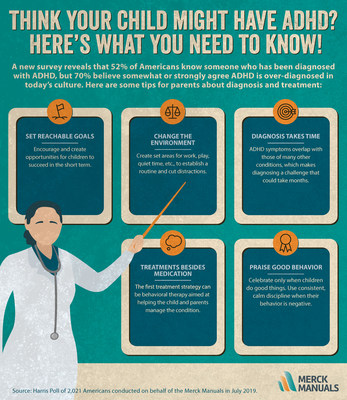More than half of Americans (52%) say they personally know someone who has been diagnosed with attention-deficit/hyperactivity disorder (ADHD), according to a recent survey from the Merck Manuals.
|
KENILWORTH, N.J., Sept. 3, 2019 /PRNewswire/ -- More than half of Americans (52%) say they personally know someone who has been diagnosed with attention-deficit/hyperactivity disorder (ADHD), according to a recent survey from the Merck Manuals. Yet perceptions surrounding diagnosis continue to make ADHD a controversial topic around the U.S.
While a slight majority of Americans have a personal connection to ADHD, seven in 10 Americans overall (70%) somewhat or strongly agree that ADHD is over-diagnosed in today's culture. Moreover, 30% of Americans believe that prescription medication is the only way to manage ADHD in children. These beliefs about ADHD and its symptoms can create a lot of uncertainty for parents wondering if their child should be tested for ADHD and what a diagnosis might mean for their future. The survey of more than 2,000 U.S. adults was conducted online by The Harris Poll on behalf of the Merck Manuals in July 2019. Other key findings include:
ADHD is a brain disorder that develops at or shortly after birth, but symptoms typically aren't apparent until age four or five and often not until children are in elementary or middle school. In a recent editorial on MerckManuals.com, Dr. Catherine M. Soprano, MD, a renowned physician specializing in pediatrics, explains that despite 30% of Americans believing prescription medication is the only way to treat ADHD, the reality is much more complex. Medications are just part of an effective treatment plan and are not necessary in every case. Behavioral therapy that aims to help both the child and parents manage the condition is often the first treatment strategy. Parents' first step should always be to talk to a physician about their child's needs. "Some parents may resist ADHD testing or diagnosis for their children," Dr. Soprano said. "They don't want the stigma or hope the child will grow out of it. But if a child's behavior is impacting their success or happiness, it's always better to talk to a pediatrician early on to explore all of the options available to them." The Merck Manuals survey also revealed some other attitudes and perceptions about treating ADHD and managing the condition.
"While each individual child requires different treatment plans, there are several broad behavior-based techniques that should be considered," Dr. Soprano said. "Those techniques include making environmental changes, setting reachable goals, and keeping behavioral responses consistent. In the classroom, an individualized education plan (IEP) is a valuable tool for success in children with ADHD." About The Merck Manuals and MSD Manuals First published in 1899 as a small reference book for physicians and pharmacists, The Merck Manual grew in size and scope to become one of the world's most widely used comprehensive medical resources for professionals and consumers. As The Manual evolved, it continually expanded the reach and depth of its offerings to reflect the mission of providing the best medical information to a wide cross-section of users, including medical professionals and students, veterinarians and veterinary students, and consumers. In 2015, The Manuals kicked off Global Medical Knowledge 2020, a program to make the best current medical information accessible by up to three billion professionals and patients around the world by 2020. For access to thousands of medical topics with images, videos and a constantly expanding set of resources, visit MerckManuals.com or MSDManuals.com and connect with us on social media: Survey Methodology This survey was conducted online within the United States by The Harris Poll on behalf of Braithwaite from July 18-22, 2019 among 2,021 U.S. adults ages 18 and older. This online survey is not based on a probability sample and therefore no estimate of theoretical sampling error can be calculated. For complete survey methodology, including weighting variables and subgroup sample sizes, please contact Joe McIntyre at joe@gobraithwaite.com. About Merck For more than a century, Merck, a leading global biopharmaceutical company known as MSD outside of the United States and Canada, has been inventing for life, bringing forward medicines and vaccines for many of the world's most challenging diseases. Through our prescription medicines, vaccines, biologic therapies and animal health products, we work with customers and operate in more than 140 countries to deliver innovative health solutions. We also demonstrate our commitment to increasing access to health care through far-reaching policies, programs and partnerships. Today, Merck continues to be at the forefront of research to advance the prevention and treatment of diseases that threaten people and communities around the world - including cancer, cardio-metabolic diseases, emerging animal diseases, Alzheimer's disease and infectious diseases including HIV and Ebola. For more information, visit www.merck.com and connect with us on Twitter, Facebook, Instagram, YouTube and LinkedIn. Media Contact
SOURCE MerckManuals.com |





